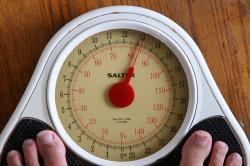With New Year’s and its attendant resolutions just around the corner, articles about weight loss are cropping up in all the usual places (i.e., everywhere you look). One of the most comprehensive and personal essays on the topic can be found in this week’s New York Times Magazine. In a story called “The Fat Trap,” Tara Parker-Pope, a longtime health writer and the editor of the Times’s Well blog, writes about both the latest research explaining why most people cannot keep weight off and about her own struggle to lose weight. In spite of healthy habits and an obviously above-average acquaintance with nutrition research, Parker-Pope estimates that she is “easily 60 pounds overweight.”
To explain the dissonance between her behavior and her reality, Parker-Pope looks into the National Weight Control Registry, which keeps tabs on 10,000 people who have lost at least 30 pounds and kept it off for at least a year. To put that number into context, consider that 30 percent of Americans—almost 94 million people, by my calculation—are currently trying to lose weight. If the ratio of successful to wannabe losers doesn’t underscore the extreme difficulty of lasting weight loss, the regimen of a National Weight Control Registry member ought to do it. Parker-Pope shadows a 66-year-old female registry member who has kept off 135 pounds for five years. This woman says that she is “always aware of food,” weighs herself every morning, weighs all her food, writes down everything she eats, counts every calorie and gram of protein that passes her lips, exercises from 100 to 120 minutes six or seven days a week, calculates exactly how many calories she burns during exercise, and avoids junk food, bread, pasta, and dairy.
Parker-Pope remarks that these efforts sound exhausting, but she skirts around the fact that they somewhat resemble the symptoms of an eating disorder. Similarly disturbing are descriptions of extreme weight-loss studies in which participants were allowed to consume only 500 calories a day. (Parker-Pope makes it sound unexpected that researchers found signs that the participants’ “bodies were acting as if they were starving”—but they were, in fact, consuming a small fraction of the calories than the average human being needs to live, which is pretty much the definition of starving.)
Fat has become so deeply pathologized in our society that behaviors considered indicators of anorexia or orthorexia when performed by thin people are endorsed by the medical establishment when performed by fat people. But, as Parker-Pope notes, it’s only the extremely “hypervigilant”—the word used by another National Weight Control who writes down everything she eats and says she can never “go back to ‘normal’ ”—who are capable of keeping weight off. As Parker-Pope emphasizes in “The Fat Trap,” researchers have discovered that genetics and hormonal changes make lasting weight loss impossible for the vast majority of fat people.
But rather than looking at this evidence and concluding that perhaps trying to make fat people thin is the wrong approach, Parker-Pope—along with some of the scientific establishment—simply digs in her heels. “[W]ith a third of the U.S. adult population classified as obese, nobody is saying people who already are very overweight should give up on weight loss,” Parker-Pope writes. In fact, many people are saying exactly that. The Health at Every Size movement, founded by researcher Linda Bacon, encourages fat people to pursue healthy behaviors (like eating a balanced diet and exercising) for the sake of health and well-being rather than weight loss, an approach that leads to more and greater physiological improvements than dieting. As Parker-Pope already knows personally—she mentions having exemplary cholesterol and blood pressure levels and “an extraordinarily healthy heart”—it is possible to be both fat and healthy.
But the deeper issue is one that Parker-Pope brings up near the end of her piece: “Nobody wants to be fat. … [T]o be fat is to be perceived as weak-willed and lazy. It’s also just embarrassing.” Unfortunately, most people agree. But it seems to me that a society that stigmatizes people for a physical attribute that they can’t change is the real “fat trap” we ought to be trying to escape—not the physical attribute itself.
